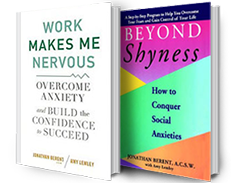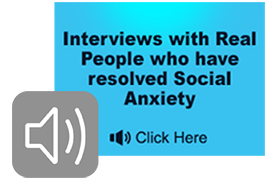
Overcoming social anxiety: insights into trauma, perfectionism, and therapy [PODCAST]
We explore the complexities of social anxiety with renowned psychotherapist Jonathan Berent. We delve into two contrasting cases: a high-achieving physician facing performance anxiety and a young adult paralyzed by avoidance. Jonathan shares insights on how trauma, perfectionism, and family dynamics contribute to social anxiety and discusses practical treatment strategies that integrate both technique and core emotional work. Join us as we uncover the critical elements for understanding and overcoming social anxiety.

Do You Suffer From Workplace Anxiety?
Amy Lemley, 46, has spent most of her life feeling like a fraud. She remembers debilitating performance pressure even as a young child. When she believed she wasn’t strong in a subject, such as science or math, she’d avoid it, once refusing to do homework for months.
Later, as a marketing copywriter, Lemley felt her anxieties surfacing again. She began worrying obsessively about how she came off to coworkers and clients. Was she being taken seriously? Did that person think she knew what she was talking about? A few times she forgot to bill her clients, and when she realized the mistake, was too embarrassed to send the bill late.

Mum’s The Word
Matt, an account executive at a major global public relations firm, had the ambition to rise to the top and the smarts to get there. But when he had to open his mouth at work, panic set in.
“For something as simple as speaking up in a meeting, my face would turn red,” says Matt, who’s in his early 30s (and asked to be identified by first name only).

Conquer public speaking fears
Are you afraid to address a crowd? Do you get anxious over small talk in an elevator? You’re not alone.
“Talking in public is the No. 1 phobia in the world,” says Jonathan Berent, a licensed psychotherapist and co-author of the book “Work Makes me Nervous.” “A number of my patients say they would consider getting into an accident on the way to work to avoid speaking in public scenarios. One patient who was an ovarian cancer survivor said she’d rather go back to chemo.”

Social Anxiety Feeds an Affliction of Isolation
Modern technology and a perfectionist culture may increase the risk We all need moments of solitude, but people are primarily social creatures. Connecting with others gives us a sense of meaning and purpose, and helps us make our way in the world. That is why social anxiety can be so devastating—it injures our ability to connect.

Bob Salter PSA Show May 13th, 2018
Author and psychotherapist Jonathan Berent discussed social anxiety, approach of the mental health profession to the problem, treatment approaches, and the ways social anxiety manifests.

Reflections on School Violence: A Psychodynamic Perspective
The mental health community must increase its clinical acumen regarding complex psycho-pathology consisting of the avoidant personality, social impotence, and related rage. School violence has taken on epidemic proportions since two disturbed adolescents masterminded Columbine and became role models for the mentally ill young men who drive the new culture of school shootings. While the profile of the school shooter has evolved over the last couple of decades, it’s worth considering the behavioral patterns and psychodynamics significantly present in school shootings. For the mental health profession to increase its clinical efficacy with this very at-risk group, this consideration is imperative.

Reflections on school violence: a psychodynamic perspective
The mental health community must increase its clinical acumen regarding complex psycho-pathology consisting of the avoidant personality, social impotence, and related rage. School violence has taken on epidemic proportions since two disturbed adolescents masterminded Columbine and became role models for the mentally ill young men who drive the new culture of school shootings.

Newsday Letters to the Editor – Therapists can help stop school shootings
I’ve had patients who say they understand why other kids shoot up schools [“Threats spike at LI schools,” News, April 2]. The mental health community must increase its clinical acumen regarding the complex psychopathology consisting of avoidant personality, social impotence and related rage if progress is going to be made to prevent school shootings…

How Do You Stop A Panic Attack From Happening? Here’s How To Keep Yourself Grounded, According To Experts
By Kyli Rodriguez-Cayro Panic attacks can throw you for a loop (quite literally — they can make you dizzy), especially if you feel one coming on at school, at work, on a date — basically, somewhere you’d rather not have one. Sometimes, it may feel unavoidable, but here’s the good news: There are techniques and skills you can use to stop a panic or anxiety attack in its tracks, according to mental health experts…



